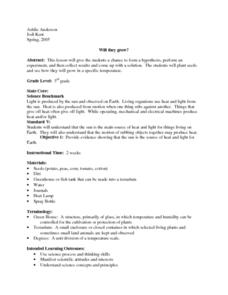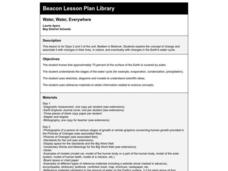Curated OER
Making A Terrarium
Students make a terrarium from common household items that are brought to class. They can be creative with materials but the method is set for how the mini-lab is set up. Students read a book about an ecosystem to stimulate the topic for...
Curated OER
The Rainforest Community
Students create a miniature rainforest ecosystem, a terrarium. Students then explain how the continuous flow of energy and food in the ecosystem allows it to sustain itself.
Curated OER
Marine & Aquatic Habitats Activities - Habitats of Birds, Fish, and Mammals on the Island and the Pacific Region
Students create habitats in jars to understand integral aspects of plants' and animals' habitats.
Curated OER
Explore: 1st Grade Plant Observation
First graders grow seeds in a mini terrarium. They compare the root systems, stems, leaves, and flowers of the different plants. They categorize the plants and discuss the basic functions of plant parts.
Curated OER
Terrariums for Project Pals
Students identify the components needed by plants to survive in the terrarium. In this biology lesson, students build their own terrariums using materials available. They present their project in class.
Curated OER
Terrarium Observation
Students observe the growth of plants in their terrarium. In this social studies lesson, students measure plant growth for several weeks. They predict what happens if other organisms are added in the terrarium.
Curated OER
Building the Terrarium
Students draw a layout of their proposed terrarium. In this social studies lesson, students discuss how Mayans farm to produce food for the family. They compare their farming method with modern farming practices.
Curated OER
Will they grow?
Third graders plant seeds and see how they will grow in a specific temperature and are questioned about different environments and how they think crops would grow there. They form a hypothesis, perform an experiment, and then collect...
Curated OER
Do You See What I See?
Second graders view a teacher-created terrarium, and complete a KWL chart. They discuss what they can see, Students go on a nature walk and compare the schoolyard to the terrarium, discussing the roles of rocks, plants, soil, and water...
Curated OER
Do You See What I See?
Students hypothesize the role of rocks, soil, and water by observing a terrarium and create a model to explore the water cycle. This is part of a five station set up.
Curated OER
Life in a Cup
Third graders make and maintain a mini terrarium. They keep a daily journal of what happens in their terrarium and record daily observations and measurements.
Curated OER
Rainforest Deforestation and the Water Cycle
Students create terrariums (mini rainforests). They observe and discuss the life processes that occur in their terrariums and how changes in these processes affect the plants and organisms inside. They collect and graph data and present...
Curated OER
The Water Cycle
Third graders compare what occurs in terrariums to the water cycle on the earth and in it's atmosphere. They create a story as evidence of their knowledge of the water cycle.















